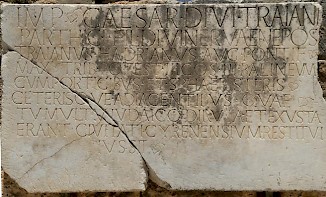Lukuas - Livius (original) (raw)
Messiah (mâšîah, "the anointed one"): Jewish religious concept, a future savior who will, in some sense, come to restore Israel. The nature of both the Messiah and the restoration was a matter of debate, and there were several claimants.
Lukuas (115 CE)
Sources: Appian of Alexandria, Civil wars, 2.90; Appian of Alexandria, Trajan's Arab War, fragment 1; Cassius Dio, Roman History, 68.32, 69.12-13; Eusebius, History of the church 4.2.1-5; Corpus Papyrorum Judaicarum 435, 436, 438, 439, 444 and 450.
This inscription, in one of the bathhouses of Cyrene, commemorates how the city was rebuilt after the tumulto Iudaico, the disorders caused by the Jews.
Story: The story is told by Eusebius:
In the course of the eighteenth year of the reign of the emperor Trajan, a rebellion of the Jews broke out and destroyed a great multitude of them. For both in Alexandria and in the rest of Egypt and especially in Cyrenaica, as though they had been seized by some terrible spirit of rebellion, they rushed into sedition against their Greek fellow citizens, and -increasing the scope of the rebellion- in the following year started a great war while Lupus was governor of all Egypt.
In the first engagement they happened to overcome the Greeks, who fled to Alexandria and captured and killed the Jews in the city, but though losing the help of the townsmen, the Jews of Cyrene continued to plunder the country of Egypt and to ravage the districts in it under their leader Lukuas. The emperor sent against them Marcius Turbo with land and sea forces including cavalry. He waged war vigorously against them in many battles for a considerable time and killed many thousands of Jews, not only those of Cyrene but also those of Egypt who had rallied to Lukuas, their king.
The emperor suspected that the Jews in Mesopotamia would also attack the inhabitants and ordered Lusius Quietus to clean them out of the province. He organized a force and murdered a great multitude of the Jews there, and for this reform was appointed governor of Judaea by the emperor.note[Eusebius, History of the Church 4.2.1-5.]
Comment: Go here for more details. Since the diasporic Jews destroyed pagan sanctuaries and their leader was called king, it is plausible that Lukuas (who is also called Andreas) was considered the Messiah.
